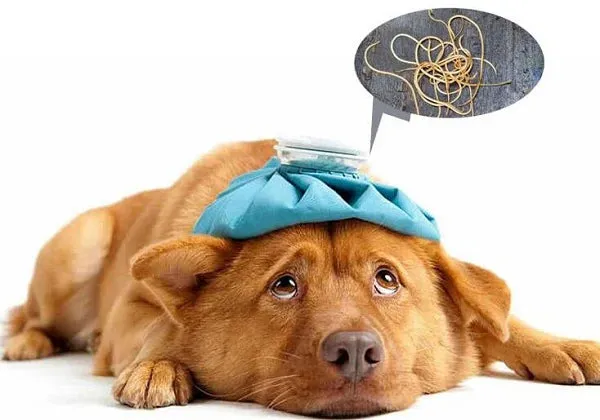It’s a common concern for new puppy owners: noticing blood in your puppy’s stool after deworming. While this can be alarming, understanding the process and potential causes can help you navigate this situation with confidence. This article delves into why puppies might have blood in their stool post-deworming, what’s considered normal, and when to seek veterinary attention, offering comprehensive guidance for a healthy puppy.

Intestinal parasites, or worms, are an unfortunate reality for many dogs, especially puppies. These unwelcome guests can cause discomfort, itching, and a range of health issues if left untreated. Deworming is a crucial step in safeguarding your puppy’s health, but it can sometimes lead to temporary side effects, including the presence of blood in their stool. Understanding this process is key to ensuring your puppy recovers smoothly and remains a happy, healthy companion.
What is Deworming and Why is it Essential?
Deworming is the process of administering medication to eliminate internal parasites, primarily worms, from a dog’s digestive system. While some parasites, like heartworms, affect the circulatory system, deworming typically targets those residing in the gastrointestinal tract, mainly the colon.
The medication for deworming comes in various forms, including pills and injections. It’s vital to follow your veterinarian’s prescribed dosage and schedule precisely. Deviating from the recommended treatment can lead to recurring worm infections.
Deworming is paramount because worms can cause a multitude of problems for dogs. Puppies, with their developing immune systems, are particularly vulnerable to complications. Symptoms of worm infestation can include:
- Diarrhea or vomiting
- Unexplained weight loss
- Abdominal pain
- Lethargy and lack of energy
- Dehydration
- Poor coat quality
- A distended or swollen abdomen
- Blood in the stool
- Nutrient deficiencies, hindering growth and development
Common Types of Worms Affecting Puppies
Four main types of intestinal worms frequently affect puppies: roundworms, tapeworms, hookworms, and whipworms.
Roundworms
Two species of roundworms commonly infect dogs: Toxocara canis (T. canis) and Toxascaris leonina. T. canis is more prevalent in puppies and poses a zoonotic risk, meaning it can be transmitted to humans. Puppies can contract roundworms from their mother through milk or even in utero. They can also become infected by ingesting roundworm eggs found in contaminated soil, feces, or from scavenging on dead animals. Roundworms are often described as resembling moving spaghetti and can grow several inches long. Their eggs are typically small, round, and white.
Tapeworms
Tapeworms are acquired by puppies when they ingest infected fleas. When a puppy swallows a flea carrying tapeworm eggs, the parasite lifecycle continues within the puppy. Tapeworms can lead to stunted growth and other serious health issues. These worms are flat and segmented, capable of growing up to a foot long. Individual segments can detach and are often passed in the stool, serving as an early indicator of tapeworm infection.
Hookworms
Hookworms are named for their small, hook-like mouthparts. These tiny parasites, measuring about a quarter-inch long, are difficult to detect with the naked eye. Hookworms attach to the intestinal lining and feed on blood, potentially leading to anemia. Puppies can contract hookworms from their mother or by ingesting infected material. Signs of hookworm infection include abdominal pain, lethargy, and severe cases of anemia.
Whipworms
Whipworms, also about a quarter-inch in length, are another common intestinal parasite. Dogs contract whipworms by consuming infected feces or contaminated objects. Whipworm eggs are remarkably resilient, capable of surviving in the environment for up to five years, making surfaces appear contaminated even when they are not visibly so. Microscopic eggs are the primary mode of transmission. Chronic diarrhea, lethargy, and abdominal discomfort are common symptoms of whipworm infestation.
How Long After Deworming Will My Puppy Expel Worms?
It is considered normal for your puppy to continue passing worms in their stool for approximately 7–10 days after a deworming treatment. In some instances, depending on the severity of the parasitic infestation, it might take up to 14 days for all worms to be completely expelled from the system. Observing worms in the stool confirms that the deworming medication is actively working to eliminate the parasites.
When the treatment is successful, the worms passed in the stool should be dead. Dead worms typically appear less opaque or translucent compared to live ones. Most deworming medications begin to act within 12 to 24 hours of administration, effectively killing the intestinal worms and facilitating their natural expulsion.
According to the American Veterinary Medical Association (AVMA), roughly 34% of dogs in the United States are affected by intestinal parasites like roundworms and hookworms at some point in their lives, highlighting the critical importance of regular deworming protocols.

How Frequently is Deworming Necessary for Puppies?
Deworming is an integral component of responsible puppy care, as young dogs are inherently more susceptible to parasitic infections. A general deworming schedule is typically recommended as follows:
1. Initial Treatment:
The first deworming for puppies should ideally occur between 2 to 3 weeks of age. It’s common for puppies to be born with or acquire worms very early in life, often transmitted from the mother through the placenta or milk.
2. Regular Deworming Schedule:
Following the initial treatment, puppies generally require deworming every 2 to 4 weeks until they reach approximately 16 weeks of age. This frequent treatment is necessary because younger puppies have less developed immune systems and are more prone to reinfection.
3. Adult Dogs:
Once a puppy matures to four months old, veterinarians usually recommend deworming every 3 to 6 months. This ongoing schedule helps prevent reinfections and maintains the dog’s overall health and well-being. Data from the Companion Animal Parasite Council (CAPC) indicates that over 90% of puppies are born with intestinal parasites, underscoring the vital need for consistent deworming in their early lives.
Understanding Deworming Side Effects
While deworming medications are designed to be safe and effective, they can sometimes cause mild side effects as the body expels the parasites. These are usually temporary and manageable. Common side effects include:
1. Digestive Upset (Diarrhea, Vomiting, or Nausea)
The deworming medication itself can sometimes irritate a puppy’s digestive tract, or the process of expelling a large number of worms can cause temporary discomfort. Mild symptoms are typically normal. However, if vomiting or diarrhea becomes severe or persistent, it’s essential to consult your veterinarian.
2. Bloody Stool
When worms detach from the intestinal lining, they can occasionally cause small abrasions or cuts. This can result in red streaks or a small amount of blood in the stool. This is generally not a cause for alarm and is often a harmless consequence of the deworming process. However, if you observe excessive blood in your puppy’s stool, it warrants immediate veterinary attention.
3. Lethargy
Some puppies may exhibit increased tiredness or lethargy after deworming. This can be attributed to the medication’s effects or the physical stress of eliminating parasites. Ensure your puppy has constant access to fresh water and monitor their recovery closely.
Tips for Supporting Your Puppy During Deworming
You can actively support your puppy through the deworming process to ensure a smoother recovery and optimal well-being.
1. Provide Nutrient-Rich Food:
A high-quality, protein-rich diet is crucial for aiding your puppy’s recovery. Consider premium dog food options that offer balanced nutrition to support their system as it eliminates parasites.
2. Ensure Proper Hydration:
Deworming, especially if it leads to mild diarrhea, can cause temporary dehydration. It is essential to ensure a constant supply of fresh, clean water is available to your puppy at all times.
3. Consider Supportive Supplements:
Certain supplements can help support your puppy’s digestive health and overall well-being during the recovery period. Products formulated to aid digestion or coat health can be beneficial. Always consult with your veterinarian before introducing any new supplements.
Final Thoughts on Deworming Your Puppy
Worm infestations are a common challenge for puppies, but consistent and veterinarian-recommended deworming treatments are the key to ensuring your puppy remains healthy and happy. While it’s normal for puppies to pass worms for up to two weeks post-treatment, this is a natural part of the parasite elimination process.
Adhering to your veterinarian’s deworming schedule is paramount. It’s also important to monitor your puppy for any unusual symptoms. Persistent diarrhea, excessive blood in the stool, severe lethargy, or a lack of appetite could indicate a complication. By remaining proactive and observant, you can effectively protect your puppy from the discomfort and health risks associated with worms, guiding them toward a healthy and thriving adult life.
